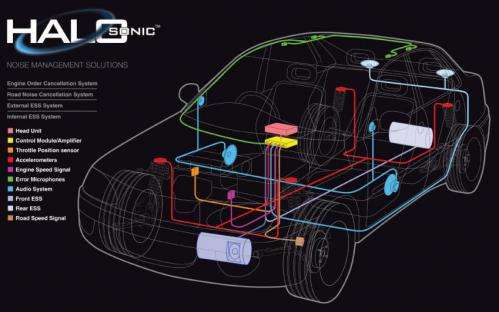Harman, an audio and infotainment company, has something called HALOsonic in its product line, for noise management, which it co-developed with Lotus Engineering. The company is expanding its noise management capabilities for eliminating road noise, as a way to improve the driving experience so that drivers and passengers can look forward to a quieter ride.
"What if we utilize the audio system to improve safety, enhance the driving experience and contribute towards a greener world?" They have the answer in HALOsonic. This consists of a suite of noise management technologies to improve noise levels and to contour sound inside and outside the vehicle. Harman is telling the automotive industry about its "road noise cancellation technology, or RNC, "which minimizes unwanted noise generated when the vehicle tires roll across the road surface." According to a special HALOsonic site from the company, "Combined with the universal trend for wider, low profile tires, road noise emanates through the structure of the vehicle, creating a 'droning' noise. This noise can induce driver fatigue and is annoying, with zero purpose or benefit."
Harman engineers recognized the auto industry need in response to achieving fuel economy by using lighter materials. and took the opportunity to resolve the problem. "In pursuing ways to lessen the environmental impact of vehicles and raise fuel efficiency," said Harman, "automakers are reducing vehicle weight, often by using less noise-dampening insulation in the car's interior." Lighter materials, however, increase perceptible road noise inside the vehicle. It penetrates "passenger ears" and also "compromises the audio experience of the on-board infotainment system."
How the Harman solution works: the chassis of the vehicle is fitted with accelerometers; the system can measure the correlation of road vibration and resulting noise inside the cabin. An algorithm in the controller creates inverse sound waves coming from each speaker through the car's audio system, to cancel out noise from the road vibration. The technology is such that only unwanted engine or road noise is cancelled, but music signals in a similar audio range are preserved.
Michael Mauser, President of Harman Lifestyle Division, called up another advantage, in the form of road safety. "Less noise also means drivers are less likely to become tired or distracted." Lotus brings to the partnership substantial knowledge of noise performance of chassis systems; the press announcement noted the work by Lotus in active suspension for its Formula 1 cars in the 1980s.
"Active suspensions model the basic cause of road noise—the varying connection between wheels and pavement," said IEEE Spectrum. In the bigger picture, Philip Ross wrote in IEEE Spectrum, "Automakers used to make their rides quieter with padding, special bushings, and thicker glass. But now that fuel-efficiency standards are forcing them to jettison every unneeded gram, they are leaning toward the active alternative: electronic antinoise."
More information: — news.harman.com/Press-Releases … -Road-Noise-1ef.aspx
© 2014 Tech Xplore
























